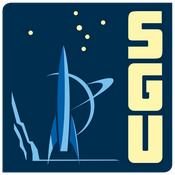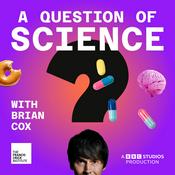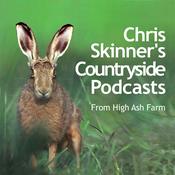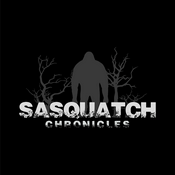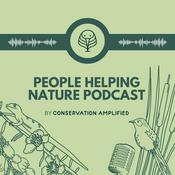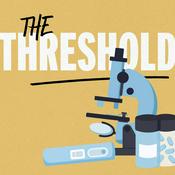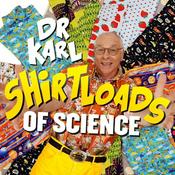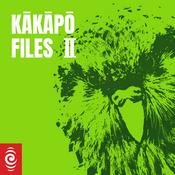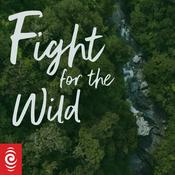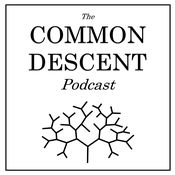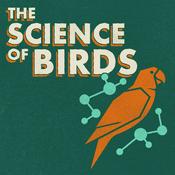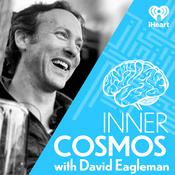33 episodes

David Topping on the Grand Canyon Prototype Experiments, Disequilibrium Transport, and Hysteresis
27/7/2025 | 1h 2 mins.
Dr. David Topping is a Research Hydrologist with the US Geological Survey.He did his undergrad at MIT, a masters and Phd at the University of Washington and has published >100 well cited peer review publications. Dr Topping has worked with the USGS for >30 years but for the last 18 or so have been with the Grand Canyon Monitoring and Research Center in Flagstaff AZ where he has been one of the reasons that the Glen Canyon releases have become in one of the most ambitious and carefully measured protype sediment experiments in history. And it is his teams extensive and precise measurements of these experiments and thoughtful analyses of those data that echoed through multiple aspects of my work in the years that followed. I went back to the papers we talk about in this episode several times……when I was working on bed mixing algorithms in HEC-RAS…and when I was working with the Corps’ Omaha district to restore sand bars on the Missouri river …and when I was interpreting sediment time series, from the main Amazon tributaries…I kept finding myself back in his literature. His team’s work on processes that build and erode sand bars, his distinction between flow regulated and bed regulated transport, and his careful identification of the time scales and grain sizes at play when we think about ‘supply limitation’ and disequilibrium transport have all made their way into my work and my mental model of rivers.You can find more of his work at these links:https://www.usgs.gov/staff-profiles/david-j-toppinghttps://www.usgs.gov/centers/southwest-biological-science-center/science/river-sediment-dynamicshttps://www.gcmrc.gov/discharge_qw_sediment/This series was funded by the Regional Sediment Management (RSM) program.Mike Loretto edited the first three seasons and created the theme music.Tessa Hall is editing most of Season 4.Stanford Gibson (HEC Sediment Specialist) hosts.Video shorts and other bonus content are available at the podcast website:https://www.hec.usace.army.mil/confluence/rasdocs/rastraining/latest/the-rsm-river-mechanics-podcast...but most of the supplementary videos are available on the HEC Sediment YouTube channel:https://www.youtube.com/user/stanfordgibsonIf you have guest recommendations or feedback you can reach out to me on LinkedIn or ResearchGate or fill out this recommendation and feedback form: https://forms.gle/wWJLVSEYe7S8Cd248

Rob Ettema on River Ice, Ice-Sediment Interactions, and Sediment Scientist Biographies
17/4/2025 | 56 mins.
I grew up in one of North America’s great snow belts…and started my career in Buffalo NYSo, that background and my fascination with sediment transport primes curiosity in ice transport.I’m sure my ice friends would cringe at this, but I sometimes call ice transport as upside down sediment transport.But despite the symmetry of ice and sediment transport, they are separate, complicated, disciplines with little overlapping expertise.Which is why its remarkable, that this episode’s guest is not only is not only world class in both disciplines, but unquestionably the go-to global expert in how they interact.It is fair to say that just about everything I know about how ice effects sediment transport and river morphology, I learned from Dr. Rob EttemaSo I wanted to have Rob on the podcast to talk about the interactions between ice and the other river processes we tend to talk about in this feed. But recognizing that maybe not everyone who listens to this podcast, is initiated into the wild world of fluvial ice dynamics, we start out with some basics of river ice-formation and transport.But then we not only dove into the differences between ice-affected and ice-free rivers, but also how ice affects rivers of different latitudes, depths, and even flow directions.Dr. Rob Ettema retired Colorado State University last year, where he has been a professor since 2015 and continues to work as a research scientist. Before that he taught (and served as Engineering Dean) at the Universities of Iowa and Wyoming.He has edited ASCE’s cold regions journal, and won that society’s Rouse and Einstein (2015) Awards, which is particularly apt as he has written biographical works on the scientists both of those awards are named after.He is well know for his work on ice and scour; the former we talked about at length and the latter we barely touched. But Dr. Ettema, is also one of those researchers, that has multiple self-contained, bodies of work, which have each influenced me enough, that I would have invited him on the podcast for either topic.So in the second half of the conversation, we explore Dr Ettema’s interest in the history of the hydraulic and sediment disciplines, and a genre of literature in which he is second to none: sediment science biography.We talk about lessons from the characters he has written about, including names like Rouse, Einstein, and Radkivi.This will wrap up our Colorado State trilogy.Kind of…we are also releasing some remarkable bonus content with this episode.Jennifer Bountry (Bureau of Reclamation) invited Dr. Ettema and Dr Julien down to the Bureau’s technical service center to teach a short course together. She provided the zoom footage.So I edited a little bit and we are releasing the whole short course on the HEC sediment Youtube channel. If you found the last two episodes interesting, we have about 8 hours, of formal technical content for you to dig into.We’ll link to the playlist in the episode notes and post the This series was funded by the Regional Sediment Management (RSM) program.Mike Loretto edited the first three seasons and created the theme music.Tessa Hall is editing most of Season 4.Stanford Gibson (HEC Sediment Specialist) hosts.Video shorts and other bonus content are available at the podcast website:https://www.hec.usace.army.mil/confluence/rasdocs/rastraining/latest/the-rsm-river-mechanics-podcast...but most of the supplementary videos are available on the HEC Sediment YouTube channel:https://www.youtube.com/user/stanfordgibsonIf you have guest recommendations or feedback you can reach out to me on LinkedIn or ResearchGate or fill out this recommendation and feedback form: https://forms.gle/wWJLVSEYe7S8Cd248

Pierre Julien on Bed Forms, High Concentration Flow, and Engineering Rules of Thumb
14/3/2025 | 1h 3 mins.
Dr. Pierre Julien joined the Colorado State faculty almost 40 years ago, where he worked at CSU’s Engineering Research Center and Hydraulics laboratory. His book, Erosion and Sedimentation, is one of my most common references, and several of the algorithms we have in HEC-RAS (particularly for mud and debris flows) come directly from this text. But while Dr. Julien’s textbook includes as many partial differential equations and tensors as any other hydraulics text – maybe more – it also includes “rules of thumb” scattered throughout. I have integrated several of these nuggets of actionable, river mechanics wisdom into my field toolbox. They are heuristics I use regularly to quickly triage river processes and engineering proposals while standing next to a river or sitting in a meeting. So I was curious if these rules of thumb would make an appearance in our conversation…and I was not disappointed. We do talk some theory. He shared a couple great metaphors that helped me visualize some of the complex theoretical principles of fluid mechanics better than I had going into the conversation. But Dr. Julien does, also, intentionally develop these decision heuristics and rules of thumb, to help practitioners quickly rule in or rule out alternatives and they popped up throughout our conversation. Dr Julien won the Einstein award in 2004 and the Hunter Rouse award in 2015 the American Society of Civil Engineers lifetime achievement awards for sediment and hydraulics respectively (which is apt as we ended up talking about both the men those awards were named after). He was also named a Distinguished Member of the American Society of Civil Engineers - their highest honor - in 2022. Dr. Julien has completed projects world-wide with 50 different agencies including world bank and UNESCO and has guided at least 120 masters students and 44 PhDs from 16 different countries.This series was funded by the Regional Sediment Management (RSM) program.Mike Loretto edited the first three seasons and created the theme music.Tessa Hall is editing most of Season 4.Stanford Gibson (HEC Sediment Specialist) hosts.Video shorts and other bonus content are available at the podcast website:https://www.hec.usace.army.mil/confluence/rasdocs/rastraining/latest/the-rsm-river-mechanics-podcast...but most of the supplementary videos are available on the HEC Sediment YouTube channel:https://www.youtube.com/user/stanfordgibsonIf you have guest recommendations or feedback you can reach out to me on LinkedIn or ResearchGate or fill out this recommendation and feedback form: https://forms.gle/wWJLVSEYe7S8Cd248

Ellen Wohl on World Rivers, River Restoration, and the Dimensions of Fluvial Connectivity
21/2/2025 | 1h 2 mins.
We’re kicking this season off with one of the most prolific researchers in River Science. Dr. Ellen Wohl is a Fluvial Geomorphologist at Colorado State’s Warner College of Natural Resources.As we will discuss, Dr. Wohl has explored and studied rivers on 6 continents (so far). But she has also focused on river processes in the Colorado front range for more than 20 years, Turning up some important insights from both these scales. I’m not sure if Dr. Wohl leads the fluvial research community in annual words published…But she has to be in the conversation. In addition to countless peer-review papers she is also prolific in short-form and long-form science communication, publishing frequent blog posts and more than a dozen books.We managed to talk about a pretty wide range of topics, including large river processes, the flood pulse model, the history and current state of restoration research and practice, and a big idea we haven’t interacted with much on this podcast yet: fluvial connectivity. I first connected with her work through the multi-author review papers she led on the state of river restoration science and practice. These papers came out twenty years apart, and the second one came out twenty years ago, so I was interested to check in on the state of restoration research and what we’ve learned about this no-longer novel field.But because of her body of work, an interview with Ellen can only touch on a small fraction of her work. Since I was asking the questions, our conversations mainly followed my interests, and some of her most cited work. But this link provides a gateway to a broader range of her work:https://sites.warnercnr.colostate.edu/ellenwohl/This series was funded by the Regional Sediment Management (RSM) program.Mike Loretto edited the first three seasons and created the theme music.Tessa Hall is editing most of Season 4.Stanford Gibson (HEC Sediment Specialist) hosts.Video shorts and other bonus content are available at the podcast website:https://www.hec.usace.army.mil/confluence/rasdocs/rastraining/latest/the-rsm-river-mechanics-podcast...but most of the supplementary videos are available on the HEC Sediment YouTube channel:https://www.youtube.com/user/stanfordgibsonIf you have guest recommendations or feedback you can reach out to me on LinkedIn or ResearchGate or fill out this recommendation and feedback form: https://forms.gle/wWJLVSEYe7S8Cd248

"Ask an Editor" with Amy East (Bonus short)
11/1/2025 | 18 mins.
The peer review process can feel like hazing to a new (or not-so-new) river scientist. Many excellent practitioners are learning from their rivers every day, but it can feel like if it doesn't get into peer review, it doesn't "count." So we separated this short segment from my conversation with Dr. Amy East, the Editor-in-Chief of AGU's Journal of Geophysical Research: Earth Surface (and >10 years experience editing high impact journals) to provide a little primmer on how to negotiate the peer review process. Amy has some really helpful thoughts on how to move from a "Report on a River" to a "Scientific Contribution" that will land well in a journal....and look for the first episode of Season 4 in a few weeks.This series was funded by the Regional Sediment Management (RSM) program.Mike Loretto edited the first three seasons and created the theme music.Tessa Hall is editing most of Season 4.Stanford Gibson (HEC Sediment Specialist) hosts.Video shorts and other bonus content are available at the podcast website:https://www.hec.usace.army.mil/confluence/rasdocs/rastraining/latest/the-rsm-river-mechanics-podcast...but most of the supplementary videos are available on the HEC Sediment YouTube channel:https://www.youtube.com/user/stanfordgibsonIf you have guest recommendations or feedback you can reach out to me on LinkedIn or ResearchGate or fill out this recommendation and feedback form: https://forms.gle/wWJLVSEYe7S8Cd248
More Science podcasts
Trending Science podcasts
About RSM River Mechanics Podcast
Listen to RSM River Mechanics Podcast, The Skeptics' Guide to the Universe and many other podcasts from around the world with the radio.net app
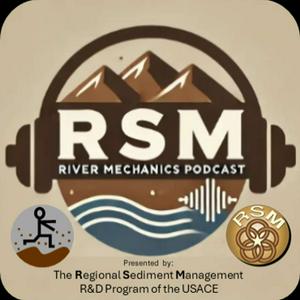
Get the free radio.net app
- Stations and podcasts to bookmark
- Stream via Wi-Fi or Bluetooth
- Supports Carplay & Android Auto
- Many other app features
Get the free radio.net app
- Stations and podcasts to bookmark
- Stream via Wi-Fi or Bluetooth
- Supports Carplay & Android Auto
- Many other app features


RSM River Mechanics Podcast
download the app,
start listening.
